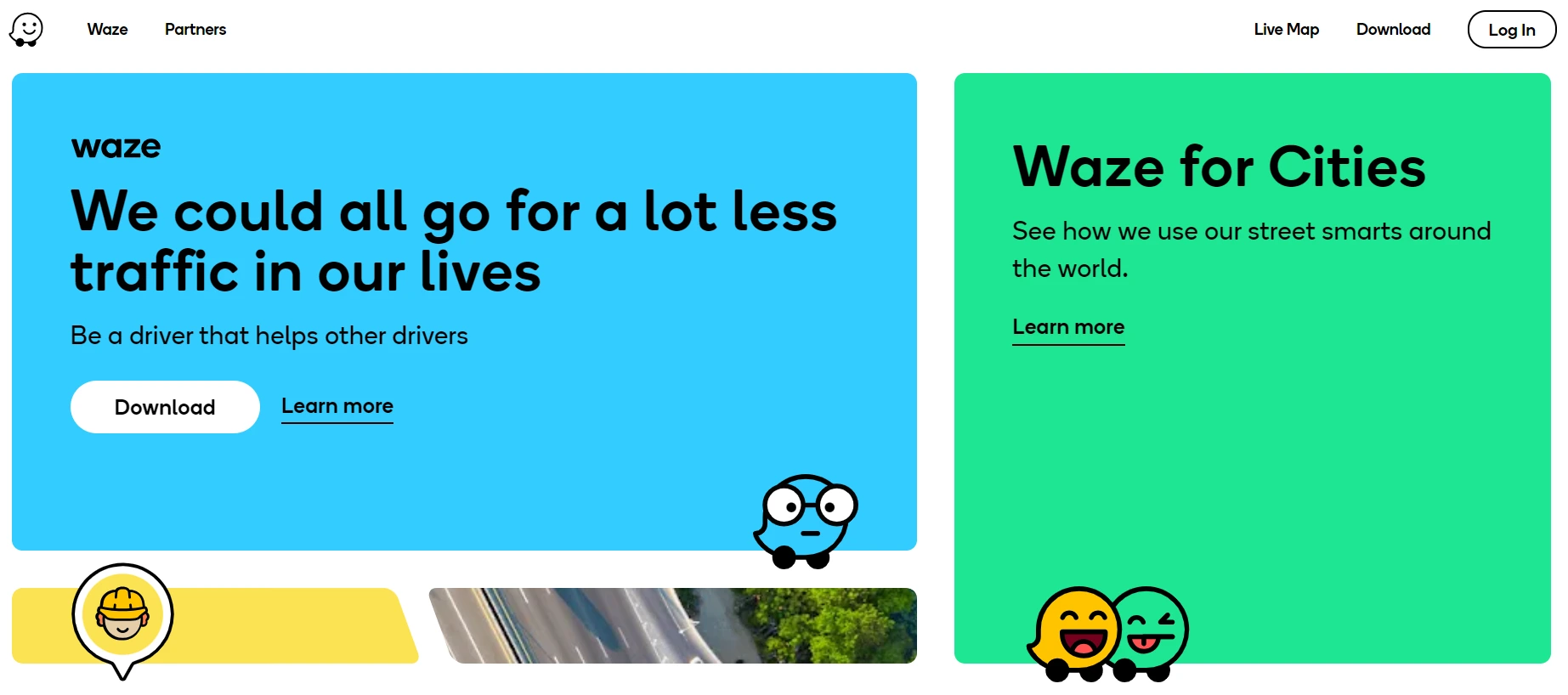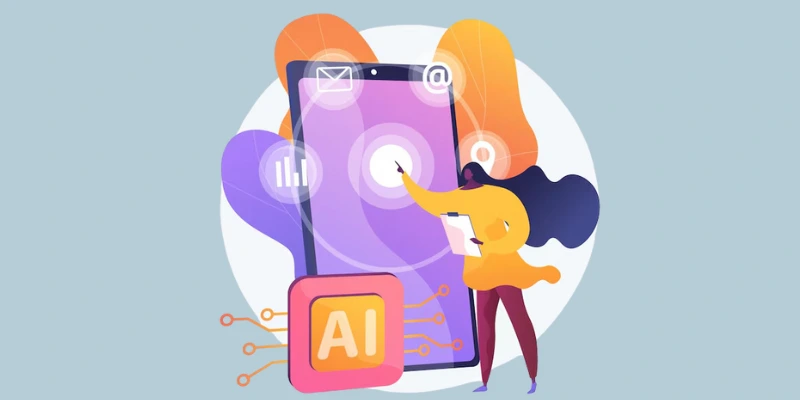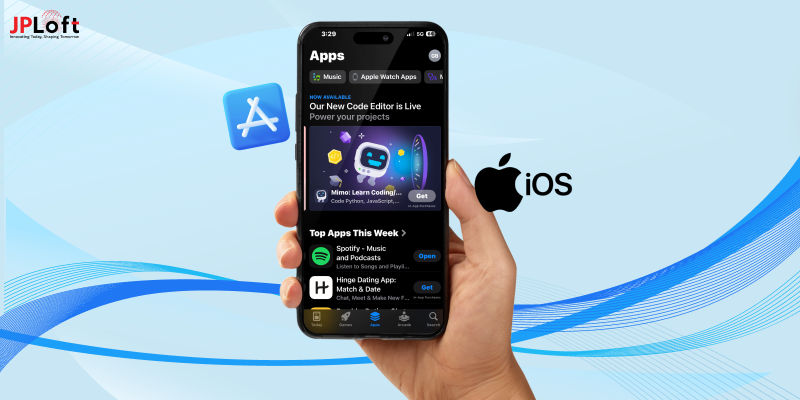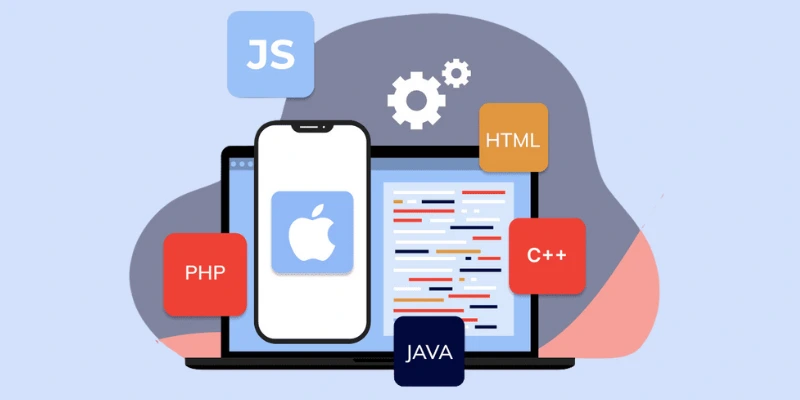Imagine an app that could understand clients' preferences, show them content they would probably like to hear, and even predict their future needs. This is not a distant future; this is the reality achievable today with the evolution of technology in AI.
Whether launching a new startup to disrupt the market or upgrading an existing business with artificial intelligence, these need to be among the most powerful user retention strategies.
Although AI was only recently available to the masses, by June 2024, 230 million people had already used AI applications. Earnings in the AI application sector reached 1.8 billion USD in 2023 and will increase to 18.8 billion USD by 2028 (Business of Apps). Furthermore, from the McKinsey report, 59% of respondents indicated that they saw a positive revenue increase because of having implemented AI in at least one function.
So, let's get started. Introducing artificial intelligence into iOS app development is not such a Herculean feat, so to speak, though it sounds scary and full of jargon and convoluted algorithms. You need not worry!
The blog will enlighten you on the integration of AI with iOS by explaining real-world instances and giving you detailed insights, whether you are looking to build a healthcare app or personal training software.
Let's look at some practical ways to incorporate AI into apps!
Why Should a Company Integrate AI into its App?
It's not just a thing to make apps cool by adding AI. It's a smart and savvy approach that can change an app and user interface. And here are some good reasons for the integration of AI with iOS, as explained, along with their practical benefits.
Customized Offers
Think that you are in a store, and the manager seems to be aware of your likes and dislikes, suggests a range of your favorite items, and even remembers the last product you bought there. All that AI development services do for your app. This API also creates the possibility of marking which products a certain user is most likely to be interested in and creating loyalty among users.
AI is implemented in various fields, such as fitness applications, commercial uses, or financial accounting. This targeting increases interactivity among consumers and boosts product buying. According to a report by Accenture, ninety-one percent of customers are more prepared to buy from brands that give them recommendations and discounts.
Enhanced Engagement and Retention of Users
Any company that hire iOS app developers will quickly see that user interaction lies at the core of any application. The real solution to keeping users entertained is leveraging AI. AI can dramatically re-invent and improve the functionality of your application by automatically changing settings and content based on user behaviors. As AI becomes a feature of your app, it makes it much more personalized and responsive to individual user needs. If you are interested in using advanced conversational AI, make sure to check out the integration options with ChatGPT.
For instance, notifications generated with the help of AI can be employed to inform him about available stores, abandoned carts, or products that he might like according to the user's search history.
HubSpot said that a business spends five times more money to retain a new customer than retaining an old one. AI increases the user retention rate with the help of timely material; hence, it is a way to improve the organization's revenue.
Process Automation and Optimisation
Common, mundane tasks are highly redundant and contain large margins of error, whereas AI removes those imperfections. From answering customer service queries through a chatbot to personalizing even other factors like content suggestions, AI can make it possible to achieve efficiency in almost every other aspect of your app. This doesn't just make the work more productive but also ensures that most of your team time is spent working on the real issues.
For example, the Uptech project "Hamlet" uses artificial intelligence (AI) to significantly speed up the process of summarizing lengthy texts in a brief time, freeing up the user's brain.
Price Reduction
Knowing how to incorporate AI into an app may help an iOS app development company lower its costs since it is an inexpensive solution. AI is advantageous in resource management, identifying when resources require repair or replacement to avoid expensive breakdowns and providing energy-efficient improvements. Plus, it can replace many functions in customer support, so the company does not need to hire iOS app developers in bulk.
In addition, because it predicts potential issues and can automate repetitive tasks, AI contributes to lower operational costs and a more effective application over time.
Data Insights
Adding AI capabilities to your mobile app will enhance its ability to analyze data and find patterns that would not otherwise be apparent. Those patterns can become a basis for developing business strategies, making effective decisions that contribute to the business's growth, and discovering other opportunities for improvement and growth.
For instance, AlphaFold, founded by DeepMind, revolutionized the biological research paradigm by making a protein folding prediction and showing what AI can do to discover patterns beyond the capabilities of the human race.
Instances of AI Integration into Mobile Applications
Snapchat
Normally, the use of AI in engagement depends on augmented reality and machine learning in applications, and Snapchat is a perfect example. Snapchat wanted to come up with lenses and filters that would, in the future, engage users of the application in real-time once they integrated AI. By extracting facial features and recognizing faces, AI enables users to apply fun, cute filters to pictures and videos. Integrated machine learning algorithms further make the app's AR function interesting and entertaining so that users keep using it.
Ikea Place
The main idea behind Ikea Place is to change how people experience furniture buying through the medium of artificial intelligence. It's an augmented reality and AI-based tool that lets buyers see furniture in their estimations before they place an order from Ikea. Ikea Place uses AI algorithms to estimate room size properly and place virtual furniture within the room; that is, the application increases customer satisfaction by eliminating uncertainty.

Waze
The social navigation app Waze enables users to submit real-time reports of traffic conditions and opt for the best routes based on built-in artificial intelligence. Using the data of millions of users, machine learning models predict traffic conditions and determine the best route. This helps Waze to self-train and ensure the best driving experience for its consumers. It allows Waze to propose other great features, such as alerting of hazards and current fuel prices, which become critical appliances for any driver.

Spotify
AI in Spotify is just one of several innovations that have rocked the music streaming business. In the current application, personalization combines a recommendation system via various machine learning techniques to offer the most optimized playlists and compatible songs that match the users' listening habits. Therefore, the AI-based recommendation system is the foundation for delivering such personalized playlists as Discover Weekly and Daily Mix. In other words, through the strategy of integration of AI with iOS, Spotify entertains not only a more loyal audience but also people thronging to their chosen music.
Waymo
Google is followed by Waymo, an Alphabet Inc. company known for using self-driving car technology. This self-drive is achieved via the use of deep learning and computer vision, identifying objects in a real environment and making decisions in such an ecosystem. Information obtained through sensors is processed by AI programs to address issues of road safety and efficiency. New inventions from Waymo touch base on subtopics such as artificial intelligence in self-driving vehicles and what the driving world might look like.
Amazon
Amazon operates in various domains where AI enhances the experience it provides for its consumers while upgrading service delivery per business requirements. An example can be seen in the recommendation engine that is being spurred by AI, which suggests items customers would be interested in based on their browsing and purchase history.
AI is also incorporated with Alexa, a home voice control from Amazon that responds to voice commands and questions through natural language processing. Moreover, the features of inventory procurement and supply, delivery, and customer satisfaction are further empowered with AI algorithms.
Obstacles of Using AI in Applications and the Process to Overcome Them
It's difficult to integrate AI into an app and achieve the desired outcomes. Concerns can range from data quality to moral and legal dilemmas. Here, we outline the most common problems that may arise when incorporating AI into an app and provide solutions.
Guaranteeing Quality and Availability of Data
Availability and data quality are essential factors that must be considered when making decisions in any iOS app development company. Data is literally the heartbeat and foundational element that feeds into making AI. But then, here is the catch. The quality and availability of data can be an issue. If poor-quality data leads to compromised-quality models, then inferior results are seen.
To overcome this, data validation tests and data cleaning exercises should be carried out. In addition, checking and revision procedures related to data collection will enable the data to be credible and up-to-date. Furthermore, combining external sources of data with internal data can build a richer dataset for AI training.
Ethical and Lawful Considerations
Data privacy, user consent, and fairness of the algorithms used in processing big data are some of the legal and ethical implications when considering the integration of AI with iOS. Organizations have to strictly follow the regulations set for them by governments, such as GDPR and CCPA. Transparency regarding AI models' steps to reach a decision makes them trustworthy.
Thus, the risks in AI development services and implementation call for organizations to establish ethical standards and continuously monitor the moral consequences of their AI projects.
Incorporation with Legacy Systems
Most systems lack an understanding of AI integrability, which leads to probable critical operational problems. Modular integration using APIs to integrate AI functionalities into existing systems will minimize disruption. The phased implementation ensures that only segments of the new system are embedded at a time while the existing legacy system remains active throughout the transition process.
Absence of Tech AI Skills
AI talent is necessary to ensure the rollout of AI applications and solutions. To address this, one can outsource to specialized AI companies or hire iOS app developers skilled in this domain. Building competencies in-house through employee training programs is also helpful. AI-as-a-service platforms make integration easy and require minimal technical skills to operate successfully.
Elevated Prices of AI Implementation
AI projects involve huge development, implementation, and maintenance costs. Their long-term benefits are usually much greater than the cost involved. To keep costs under control, a business can start with limited initial projects to prove effectiveness and expansiveness. It also decreases infrastructure costs through cloud-based AI services. A cost-benefit analysis is a must to ensure that the initiative undertaken is in the business's best interest.
Final Thoughts
Times have changed, and adding AI to iOS app development is considered a norm and even a necessity for all enterprises so they can develop more friendly, streamlined processes to engage with users. Adding AI could help companies provide personalized services and automate processes based on data, making their apps much more efficient and user-friendly. Predictive analytics, chatbots, and advanced recommendation systems make this technology one that will change how people operate with mobile applications.
For businesses, a good iOS app development company with professionalism is very essential when it comes to ensuring the AI integration is smooth. AI is limitless, ranging from enhanced customer retention to the reduction of redundant tasks and so much more. Data quality and implementation costs are generally impediments to smooth AI implementation, which are remedied through the right approach and appropriate expertise. Ultimately, AI in iOS apps is a key business growth factor and user satisfaction factor. Hence, it is greatly worthy of investment in today's competitive digital landscape.













Share this blog